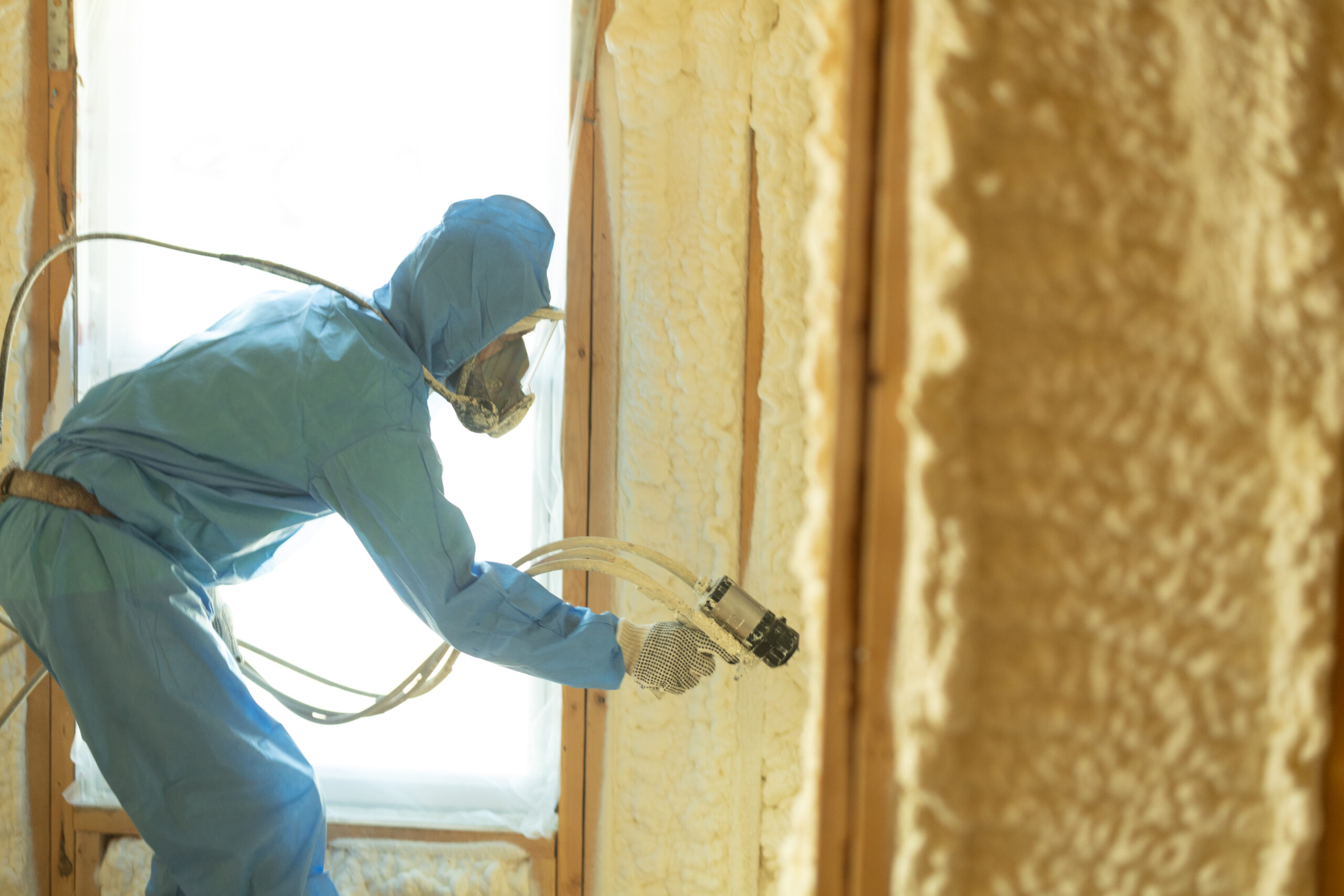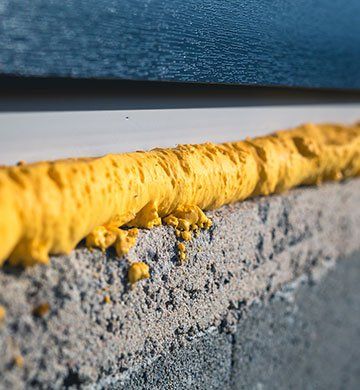Choosing the Right Sort Of Spray Foam for Your Insulation Requirements
Choosing the Right Sort Of Spray Foam for Your Insulation Requirements
Blog Article
Spray Foam: The Ultimate Service for Air Sealing and Insulation
Spray foam insulation has arised as a leading remedy for reliable air sealing and thermal insulation, providing an unique combination of properties that establish it apart from typical techniques. Comprehending the full extent of its advantages, installation procedures, and contrasts with other insulation kinds is critical for making notified decisions.
What Is Spray Foam?
Spray foam is a functional insulation product that combines the concepts of air sealing and thermal resistance to enhance power effectiveness in buildings. Made up mainly of polyurethane or various other comparable compounds, spray foam is used as a liquid that increases upon contact with surface areas, creating a solid, continual layer of insulation. This special home allows it to load gaps, splits, and spaces that typical insulation materials might ignore, providing a remarkable air seal.
There are two major types of spray foam: open-cell and closed-cell. Open-cell spray foam is lighter and a lot more flexible, using outstanding audio absorption and a lower R-value per inch - Spray Foam. On the other hand, closed-cell spray foam is denser, providing a greater R-value, moisture resistance, and added architectural integrity to developing parts
The application process commonly involves customized equipment, making certain a smooth application that complies with numerous substrates, including timber, concrete, and steel. This flexibility makes spray foam suitable for both new building and constructions and retrofitting existing structures. Its capability to develop an airtight barrier substantially adds to reducing energy usage and boosting interior air quality, thus making it a favored selection amongst builders and property owners alike.
Advantages of Spray Foam Insulation
One of the most significant advantages of spray foam insulation is its outstanding capacity to develop a continual air obstacle, which properly decreases power loss. Unlike typical insulation products, spray foam increases to load fractures and spaces, making sure that air leak is drastically reduced. This characteristic not just boosts power effectiveness however likewise results in lower energy costs gradually.
Furthermore, spray foam insulation supplies exceptional thermal resistance, adding to a more secure interior environment. Its high R-value per inch enables reliable insulation in constrained areas, making it perfect for attic rooms, walls, and crawl rooms. In addition, the moisture-resistant properties of spray foam aid stop mold and mold development, promoting much healthier living conditions.
An additional vital benefit of spray foam insulation is its sound-dampening top qualities (Spray Foam). It efficiently reduces sound transmission between spaces, creating a quieter and a lot more comfortable home atmosphere. The resilience of spray foam additionally sticks out, as it does not sag or resolve in time, keeping its performance throughout its life expectancy
How Spray Foam Works
Recognizing exactly how spray foam insulation functions is important for valuing its effectiveness in air sealing and thermal resistance. Spray foam insulation is composed of two main parts: isocyanate and polyol resin. When these elements are combined, they undergo a chemical reaction that creates the material to broaden swiftly, creating a dense foam that loads fractures, dental caries, and voids.
As the foam broadens, it complies with surface areas, creating an impermeable seal that considerably decreases air seepage. This particular makes spray foam insulation very reliable at preventing drafts and moisture penetration, which can cause power loss and damages gradually. In addition, the closed-cell version of spray foam offers superior thermal resistance due to its rigid structure, effectively reducing heat transfer.
The distinct residential properties of spray foam permit it to satisfy uneven surface areas, making sure detailed protection and a seamless barrier. As a result, spray foam insulation not just boosts power effectiveness however likewise contributes to improved interior air top quality by minimizing the build-up of allergens and pollutants. Eventually, comprehending the auto mechanics behind spray foam underscores its duty as a premium option for insulation and air sealing in both domestic and commercial applications.
Installment Refine Overview

Prior to installation, the area has to be properly cleaned up and prepped, making certain that surfaces are devoid of dampness, particles, and dirt. Because pollutants can jeopardize bond and general efficiency, this step is vital. As soon as the location is prepared, the application entails blending both parts of the spray foam, which increases upon call and loads voids properly.
Educated specialists need to perform the installment, making use of customized devices to make sure consistent protection and optimal density. Safety precautions, consisting of putting on safety gear and guaranteeing proper ventilation, are essential during this procedure. After application, the foam commonly remedies rapidly, forming a solid obstacle that improves energy efficiency.
Contrasting Spray Foam to Standard Insulation
When examining insulation options, spray foam insulation stands out in contrast to standard materials why not try here such as fiberglass and cellulose. Among the main advantages of spray foam is its premium air securing capabilities. Unlike fiberglass and cellulose, which can permit air seepage, spray foam expands upon application, loading holes and spaces to create an airtight seal. This results in boosted energy performance, as less heated or cooled down air escapes the home, bring about lower energy expenses.
Furthermore, spray foam gives a higher R-value per inch than typical insulation types, using even more efficient thermal resistance in a thinner account. This characteristic is especially beneficial in areas with minimal cavity deepness. In addition, spray foam is resistant to wetness and mold growth, which can be a considerable worry about cellulose and fiberglass, especially in moist environments.
Nonetheless, spray foam insulation typically brings a greater ahead of time price than its conventional counterparts. House owners have to weigh this initial investment against long-lasting power financial savings and efficiency advantages. Ultimately, while both insulation types serve their purpose, spray foam becomes an advanced option for modern-day insulation demands, specifically in regards to air securing and thermal performance.

Verdict
In recap, spray foam insulation stands for an extremely efficient service for achieving optimal air securing and thermal resistance. Its one-of-a-kind buildings, consisting of wetness resistance and noise dampening, make it suitable for various applications in both brand-new buildings and retrofitting jobs (Spray Foam). The preliminary costs might be higher compared to standard insulation materials, the like it lasting benefits, such as significant power savings and boosted indoor air top quality, validate the investment and highlight its value in modern-day building techniques.
Spray foam insulation has arised as a leading service for reliable air sealing and thermal insulation, supplying a distinct mix of homes that establish it apart from standard methods.Spray foam is a versatile insulation product that combines the principles of air securing and thermal resistance visite site to enhance power efficiency in buildings.When reviewing insulation options, spray foam insulation stands out in contrast to typical materials such as fiberglass and cellulose. Inevitably, while both insulation kinds serve their function, spray foam arises as a more sophisticated remedy for modern insulation requirements, specifically in terms of air sealing and thermal effectiveness.
In recap, spray foam insulation stands for a highly efficient option for attaining optimal air sealing and thermal resistance.
Report this page